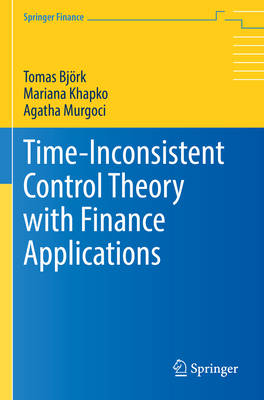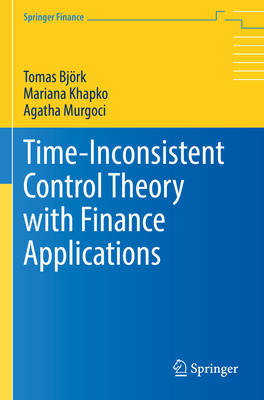
- Retrait gratuit dans votre magasin Club
- 7.000.000 titres dans notre catalogue
- Payer en toute sécurité
- Toujours un magasin près de chez vous
- Retrait gratuit dans votre magasin Club
- 7.000.0000 titres dans notre catalogue
- Payer en toute sécurité
- Toujours un magasin près de chez vous
Time-Inconsistent Control Theory with Finance Applications
Tomas Björk, Mariana Khapko, Agatha MurgociDescription
In dynamic choice problems, time inconsistency is the rule rather than the exception. Indeed, as Robert H. Strotz pointed out in his seminal 1955 paper, relaxing the widely used ad hoc assumption of exponential discounting gives rise to time inconsistency. Other famous examples of time inconsistency include mean-variance portfolio choice and prospect theory in a dynamic context. For such models, the very concept of optimality becomes problematic, as the decision maker's preferences change over time in a temporally inconsistent way. In this book, a time-inconsistent problem is viewed as a non-cooperative game between the agent's currentand future selves, with the objective of finding intrapersonal equilibria in the game-theoretic sense. A range of finance applications are provided, including problems with non-exponential discounting, mean-variance objective, time-inconsistent linear quadratic regulator, probability distortion, and market equilibrium with time-inconsistent preferences.
Time-Inconsistent Control Theory with Finance Applications offers the first comprehensive treatment of time-inconsistent control and stopping problems, in both continuous and discrete time, and in the context of finance applications. Intended for researchers and graduate students in the fields of finance and economics, it includes a review of the standard time-consistent results, bibliographical notes, as well as detailed examples showcasing time inconsistency problems. For the reader unacquainted with standard arbitrage theory, an appendix provides a toolbox of material needed for the book.
Spécifications
Parties prenantes
- Auteur(s) :
- Editeur:
Contenu
- Nombre de pages :
- 326
- Langue:
- Anglais
- Collection :
Caractéristiques
- EAN:
- 9783030818456
- Date de parution :
- 04-11-22
- Format:
- Livre broché
- Format numérique:
- Trade paperback (VS)
- Dimensions :
- 156 mm x 234 mm
- Poids :
- 485 g

Les avis
Nous publions uniquement les avis qui respectent les conditions requises. Consultez nos conditions pour les avis.






